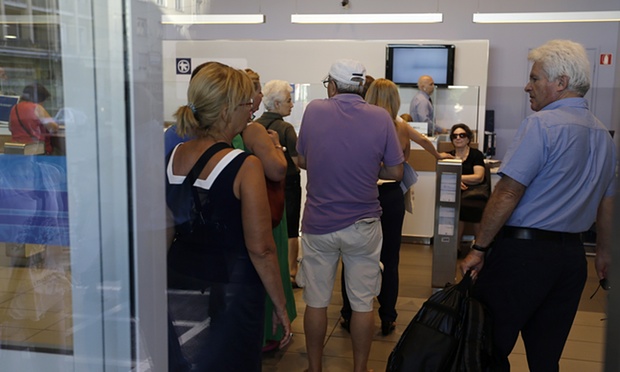July 20, 2015

Rob McSweeney and Jennifer Rankin, The Guardian, July 20, 2015
Greeks were queueing outside banks on Monday morning, as the institutions opened their doors for the first time in three weeks, amid hopes that the beleaguered nation can reach a swift agreement with its international creditors on a bailout of its wrecked economy.
Limits on cash withdrawals remain in place, but have been loosened. Greeks are now able to withdraw up to €420 (£290) a week in one transaction, rather than being limited to €60 a day. But restrictions on sending money abroad and other controls have not been lifted and the Athens stock market is closed until further notice.
“Capital controls and restrictions on withdrawals will remain in place but we are entering a new stage which we all hope will be one of normality,” Louka Katseli, head of the Greek bank association, said.
The German chancellor, Angela Merkel, said the remaining capital controls were “not normal life” and showed the need for speedy negotiations on a proposed €86bn bailout for Greece.
Greece has been given a €7.16bn bridging loan from the EU to see it through July. The government is drawing on these funds to make a €4.2bn debt payment to the European Central Bank due on Monday, but the money will have run out by August.
Eurozone leaders hope to conclude talks with Greece by mid-August
Merkel said Berlin would “negotiate hard” to ensure Athens stuck to reform agreements, but indicated that Germany would be prepared to grant Greece some debt relief. In an interview with German public broadcaster ARD, she said there could be flexibility in delaying debt repayments or reducing interest rates, but ruled out debt forgiveness – “a haircut”.
“Greece has already been given relief. We had a voluntary haircut among the private creditors and we then extended maturities once and reduced interest rates,” the chancellor said.
“And we can now talk about such possibilities again … once the first successful review of the programme to be negotiated has been completed then exactly this question will be discussed – not now but then.”
Related: Now a deal has been done, what lies ahead for the Greek economy?
Greeks will get a taste of the reforms their government has already agreed with the eurozone to secure the bailout. As of Monday, VAT on food and public transport is now 23%, up from 13%.
Ahead of the re-opening of the banks, officials urged Greeks to put cash they have been storing at home in their banks.
“When the banks reopen and normality is restored, let’s all help our economy. If we take our money out of chests and from our homes – where they are not safe in any case – and we deposit them in the banks, we will strengthen the liquidity of the economy,” Katseli told Skai television.
The chancellor’s remarks came as her counterpart in Paris, François Hollande, called for the creation of what he called a “a government of the eurozone”, reviving an idea originally put forward by former European commission chief Jacques Delors. Writing in the Journal du Dimanche, the French president proposed a government for the single currency “with a specific budget as well as a parliament to ensure its democratic control”. He added: “What threatens us is not an excess of Europe, but its insufficiency.”
In Greece, the cautious reopening of the banks, and the VAT changes, are aimed at restoring trust inside and outside the country after the aid-for-reforms deal last week averted bankruptcy.
The prime minister, Alexis Tsipras, is trying to turn a corner after reluctantly agreeing to negotiate on a third bailout, which could be worth €86bn, but will have stringent conditions attached.
It prompted a rebellion in his leftist Syriza party, but Tsipras sacked party rebels in a government reshuffle on Friday and is seeking a swift start to talks on the bailout accord with European partners and the International Monetary Fund, before elections that the interior minister, Nikos Voutsis, said were likely in September or October.
Some in Greece were sceptical that the move to reopen banks would change much. “The banks opening … won’t change anything for me,” 31-year-old hotel worker Joanna Arvanitaki told Reuters. “I never used to withdraw €60 a day – €60 is what I had a week.”
Greek banks were ordered to close on 29 June to prevent the financial system collapsing, as withdrawals skyrocketed over worries that the country’s debt crisis would see it ejected from the euro.
In the days leading up to the closure, Greeks had been taking out as much as €1.6bn a day in cash.
This article originally appeared on guardian.co.uk
This article was written by Rob McSweeney and Jennifer Rankin in Brussels from The Guardian and was legally licensed through the NewsCred publisher network.
![]()
What do you think of this $type?










